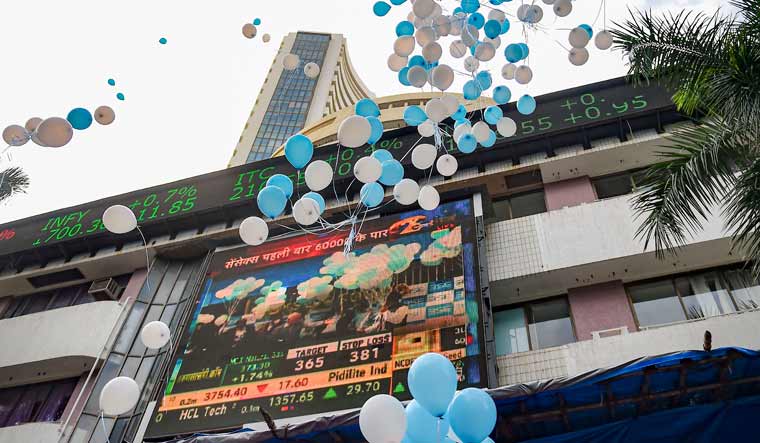Equity markets began the new Samvat (Hindu accounting year) on a strong note on Thursday. In the special one-hour muhurat trading in the evening on account of Diwali, the BSE Sensex gained 307 points or 0.51 per cent to close at 60,078.66 points. The broader NSE Nifty 50 index also rose 0.5 per cent or 88 points to end the session at 17,916.8 points.
The Samvat year 2077 had been one of the best years for investors in more than 12 years. The BSE Sensex as well as the Nifty 50 gained 40 per cent in the year that saw a surge in retail investors entering the market after the COVID-19 pandemic had led to a huge crash across global markets in Feb-March 2020.
During the special muhurat trading session, the Sensex hit a day’s high of 60,207.97 before clawing back some of the gains. Major gainers among the bluechip stocks included Mahindra & Mahindra, which rose 3.1 per cent, ITC was up 2.1 per cent and Bajaj Auto, Sun Pharma, Kotak Mahindra Bank and Larsen & Toubro all rose around 1 per cent or more.
The new Samvat may have begun on a positive note, analysts feel investors should temper down their return expectations this year, especially after the strong gains last year.
“After the spectacular returns in Samvat 2077, investors should expect modest returns only, say in low teens, in Samvat 2078,” said V.K. Vijayakumar, chief investment strategist at Geojit Financial Services.
Unlike the last Samvat, this year is likely to be more volatile, he feels. There are various factors at play.
“Rising inflation would be the biggest known threat to the market. Rate hikes by the Federal Reserve can happen by the end of 2022 or, perhaps, earlier than that,” he said.
Earlier this week, the Fed said it would start tapering its bond buying programme from this month. Interest rate hikes in the US, which are expected from next year, will lead to some capital outflows from emerging markets, including India, say analysts.
“After a great year for equity markets, investors are looking forward to markets continue rising, though not at the same pace. Global headwinds in the form of rising inflation and withdrawal of monetary stimulus may impact the momentum, but strength in Indian macros and improving micros may help offset these,” said Dhiraj Relli, MD and CEO of HDFC Securities.
In the domestic market, while the economy is expected to gain traction as the COVID-19 cases drop and vaccinations have picked up pace, a rise in crude oil prices is a worry on inflation. On Wednesday, the Union government announced a cut in VAT on both petrol and diesel, which was followed by a cut in VAT by several states, which should cool fuel prices to an extent. But upside risks do remain, say analysts.
“Macro headwinds like high oil prices, supply chain disruptions, the debate on transient versus structural inflation, the possibility of hardening interest rates across the globe, internal economic challenges in China and its global ramifications, and the ongoing US-China spats will keep global and local markets volatile,” said Krishna Kumar Karwa, MD of Emkay Global Financial Services.
Over the medium-term IT stocks, domestic manufacturing companies, real estate and related companies, capital market intermediaries, capital goods firms and financial services firms are expected to do well over the medium-term, added Karwa.
“Benchmark index returns in the short term may not be the right way to assess the investment opportunity. A carefully constructed portfolio, which harnesses the tailwinds, which the Indian economy is expected to enjoy in the coming years, should deliver 12-15 per cent compounded returns over the medium term,” he said.





